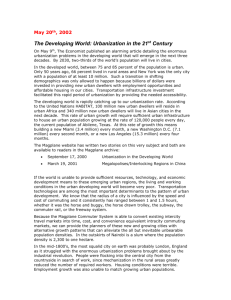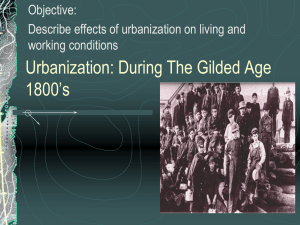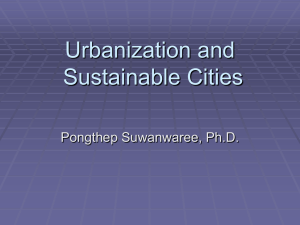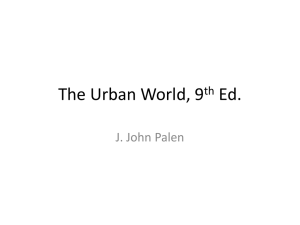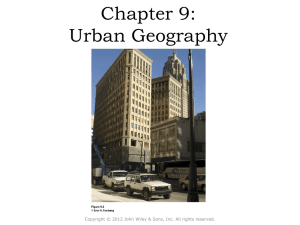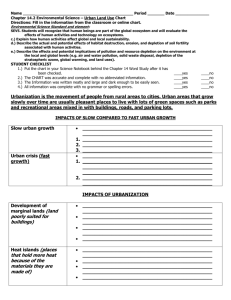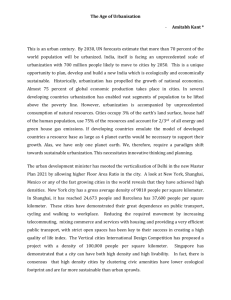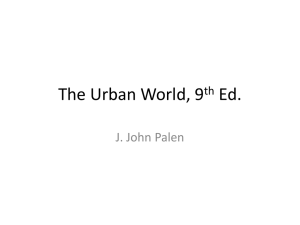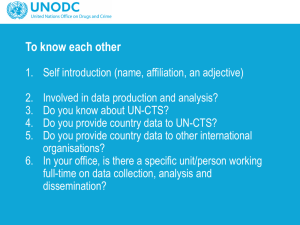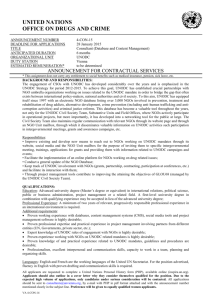Spc Issue 5
advertisement
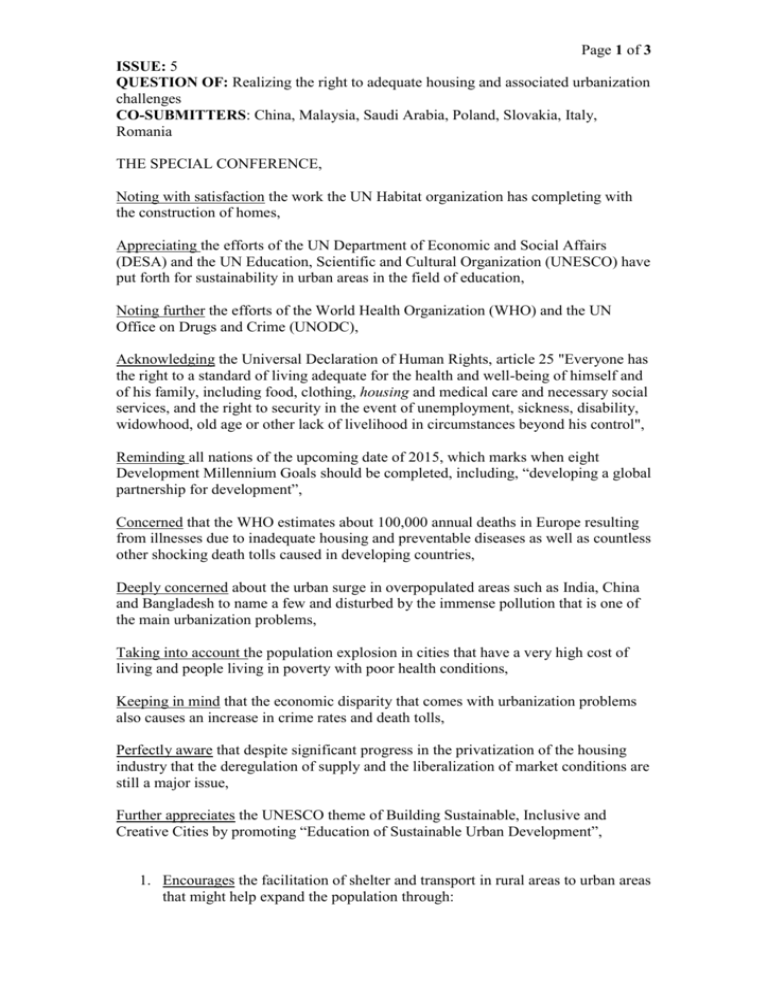
Page 1 of 3 ISSUE: 5 QUESTION OF: Realizing the right to adequate housing and associated urbanization challenges CO-SUBMITTERS: China, Malaysia, Saudi Arabia, Poland, Slovakia, Italy, Romania THE SPECIAL CONFERENCE, Noting with satisfaction the work the UN Habitat organization has completing with the construction of homes, Appreciating the efforts of the UN Department of Economic and Social Affairs (DESA) and the UN Education, Scientific and Cultural Organization (UNESCO) have put forth for sustainability in urban areas in the field of education, Noting further the efforts of the World Health Organization (WHO) and the UN Office on Drugs and Crime (UNODC), Acknowledging the Universal Declaration of Human Rights, article 25 "Everyone has the right to a standard of living adequate for the health and well-being of himself and of his family, including food, clothing, housing and medical care and necessary social services, and the right to security in the event of unemployment, sickness, disability, widowhood, old age or other lack of livelihood in circumstances beyond his control", Reminding all nations of the upcoming date of 2015, which marks when eight Development Millennium Goals should be completed, including, “developing a global partnership for development”, Concerned that the WHO estimates about 100,000 annual deaths in Europe resulting from illnesses due to inadequate housing and preventable diseases as well as countless other shocking death tolls caused in developing countries, Deeply concerned about the urban surge in overpopulated areas such as India, China and Bangladesh to name a few and disturbed by the immense pollution that is one of the main urbanization problems, Taking into account the population explosion in cities that have a very high cost of living and people living in poverty with poor health conditions, Keeping in mind that the economic disparity that comes with urbanization problems also causes an increase in crime rates and death tolls, Perfectly aware that despite significant progress in the privatization of the housing industry that the deregulation of supply and the liberalization of market conditions are still a major issue, Further appreciates the UNESCO theme of Building Sustainable, Inclusive and Creative Cities by promoting “Education of Sustainable Urban Development”, 1. Encourages the facilitation of shelter and transport in rural areas to urban areas that might help expand the population through: Page 2 of 3 ISSUE: 5 QUESTION OF: Realizing the right to adequate housing and associated urbanization challenges CO-SUBMITTERS: China, Malaysia, Saudi Arabia, Poland, Slovakia, Italy, Romania a) increasing funding in the UN Habitat to create adequate low cost homes, b) providing transports to the people working in the urban areas (i.e. trains and busses) that can provide mass transportation and allow children to attend school; 2. Requests that specific areas within urban areas that can be guaranteed safe environment and provide low cost housing by: a) allowing public transport in these areas that are in urban areas, but not in the heart of the city, b) channeling funds into new housing constructions and renovate existing housing stock, c) having several functions in these facilities such but not limited to a resource center such as a library with encouraged donated books and a first aid center; 3. Designates the control of illegal drugs and crime to the sole body of the UNODC that can work with each individual country’s national sovereignty to eliminate the widespread of urban drug abuse and crime by: a) enforcing strict laws against the use of dangerous drugs that can spread viruses and illness and well as harm oneself, b) eliminating slums close to urban areas and in urban areas itself where there are high rates of drug abuse and crime, c) training UNODC professional peacekeepers that can be sent to these urban areas and further train the staff to enforce these policies; 4. Urges all nations to increase education facilities through working with UNESCO in urban areas that can ensure a sustainable future with: a) the construction of public schools and employment of teachers and staff to increase the national economy, b) providing public and inexpensive transport to these places, c) raising awareness of pollution by: i. teaching students the effects of pollution which are detrimental in urban societies at an early age, ii. having the students create movements for this issue and practice the methods of pollution reduction in their homes and expanding the knowledge to adults, iii. expanding campaigns through media (radio, television and others) to increase environmental awareness; 5. Hopes to significantly reduce with the determination of the UN Environment Program (UNEP) and the burning of greenhouse gases that prevail in urban areas through: a) providing transportation that is environmentally safe, such as but not limited to hybrid cars, electric cars and the innovation of hybrid buses, Page 3 of 3 ISSUE: 5 QUESTION OF: Realizing the right to adequate housing and associated urbanization challenges CO-SUBMITTERS: China, Malaysia, Saudi Arabia, Poland, Slovakia, Italy, Romania b) creating alternative sources of energy from outside these urban areas at each nation’s discretion with the help of the UNEP to solve this issue by implementing devices such as but not limited to: windmills, hydroelectricity and nuclear plants, c) discouraging any other harmful fossil fuel burning activities; 6. Recommends all nation to consider the population they have and its’ growth rate and accordingly create restrictions to the number of births that can tip off the balance of population of each nation by setting fines and a more controlled growth; 7. Invites WHO to continue its rigorous efforts in combatting infections from poor housing and overall illness from urban cities by creating a substantial fund for a basic healthcare system in the major and rapidly increasing urban cities in populations that can provide a stable medical care; 8. Trusts that each nation in collaboration with DESA is working to combat extreme poverty and discrimination by: a) providing a mass quantity of jobs relating to each nation’s most immediate needs, b) working with DEAS, appreciating contributions for levels of economic disparities to be eradicated, c) promoting campaigns to minimize discrimination against people with poor housing conditions; 9. Expresses its satisfaction with the World Food Program (WFP) and wishes to expand this idea to the areas with most extreme poverty due to urbanization and sustain every person as stated in their human rights; 10. Recommends all nations to enable people with illness, disability, old age or widowhood to sufficient equal rights corresponding to each nations sovereignty and providing them with a funds and specific employment that they are able to accomplish; 11. Decides to remain actively seized upon the matter.
